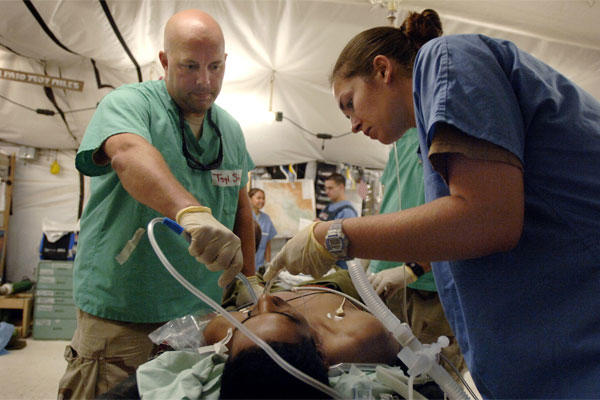Military hospitals and clinics allowing doctors to practice a variety of specialties are critical to keeping medical staff combat-ready, they say.
"To ensure the readiness of the entire medical team for a broad range of missions we must maintain and sustain our hospitals and clinics as our readiness and training platforms. This system ensures our force is trained, ready and relevant," Brig. Gen. Robert Tenhet, the Army deputy surgeon general, testified Feb. 26 before a House subcommittee.
Lawmakers said they're looking for ways to balance that combat readiness with reforming the military health care system.
"The purpose for this hearing is that as we undertake the reformation of the military healthcare system, we want to make sure that we keep readiness first and foremost in our minds, and we don't impede, one, the readiness of our military medical providers -- but certainly that we don't hinder the medical readiness of our troops," said Rep. Joe Heck, a Republican from Nevada and chairman of the House Armed Services Personnel Subcommittee.
The hearing was the latest in a series of meetings examining military healthcare before both the House and Senate armed services personnel subcommittees.
Lawmakers have said they plan to propose a series of health care reforms as part of the 2017 National Defense Authorization Act process, but want to strike a balance between keeping training options available for military healthcare providers, lowering taxpayer military healthcare costs and providing excellent care to military member, families and retirees.
The Pentagon's budget request for fiscal 2017, which begins Oct. 1, proposes recasting the primary Tricare plans under different names, raising costs, particularly for retirees, and pushing beneficiaries to use military providers instead of civilian doctors. Lawmakers have not specifically addressed that plan during the hearings, but have indicated that the price increases for users are unacceptable.
One common criticism of military healthcare among lawmakers is that many of the system's providers focus on military family care instead of combat readiness. But military officials at the hearing said that those services do play a readiness role both from a stateside perspective as well as during deployment.
"We need to maintain readiness not only of our active duty members but of our families also, and the OBGYN and pediatric care that we provide help us to maintain that family readiness so when that active duty member is deployed they have confidence that their family will be taken care of," said Maj. Gen. Dorothy Hogg, the Air Force's deputy surgeon general.
Tenhet, the Army deputy surgeon general, said women today represent a high percentage of troops on the battlefield.
"In any given [forward operating base] we may have upwards of 30 percent females, so a 'gynecologist in theater' is not a misnomer," he said. "Eighty percent of our evacuations are disease non-battle injuries as well. So sustaining just within the trauma system itself, we have to look across the entire system of medicine."
--Amy Bushatz can be reached at amy.bushatz@military.com. Follow her on Twitter at @amybushatz.




























